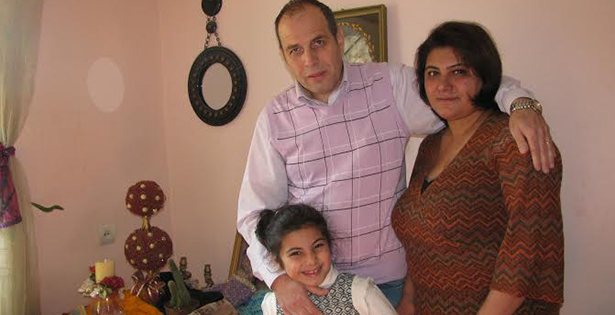Stepan Mahshigian: “The Homeland is the people living therein and human relations”

Due to the war in Syria, many Syrian-Armenians moved to the Homeland with the plan to settle, while some dream of returning to their hometowns after the reestablishment of peace to protect their homes and stores and Armenian cultural values, without losing their connection with the Homeland. I have talked about this and other issues with many Syrian-Armenians and have received different responses, but the one thing that was the key point in their responses was the love for the Homeland. I had a similar conversation with Stepan (Steve) Mahshigian and his seven-year-old daughter, Stephanie.
Hayern Aysor: When did you move to the Homeland? Whom and what did you leave in Syria?
Stepan Mahshigian: I came to Armenia in 2012 when the war had just begun in Syria. I left my house, my job, my close and loyal friends and precious Armenian cultural values, including the Armenian church and school…It wasn’t easy. I had a gift shop in Aleppo where my wife and I would sell our handmade items. They were beautiful gifts. We also have a gift shop here. My wife, Karmen is very gifted. She makes tasty appetizers and jams), as well as cakes and meals which we sell at our shop. We have also participated in all the exhibition-sales and other exhibitions organized by the RA Ministry of Diaspora. Thank God, we have everything and are independent.
Hayern Aysor: Stepan, where do you work now?
I work at the “My Path” Center for children suffering from autism. I already had experience working with autistic children. I have worked with children suffering from Down Syndrome for nearly 10 years in several countries across Europe. I teach these children how to make handmade items. I am very connected to them. I love those children and aspire to do everything I can to help them. The children love me too and wait impatiently for our lessons. I am very grateful to the Center’s director Narine Vardanyan. I am touched by her kindness. She treated me in a way that I didn’t feel like a stranger here as a Syrian-Armenian. Overall, the people in Armenia received us with warmth and generosity. I have also worked for a travel agency and have taken groups and families to Western Armenia. I am fluent in English, Turkish and Arabic and am currently studying Persian. I am content with our situation. My family is safe, and we will soon have a home in Musaler. Before moving to Armenia, I had already visited the country twice. I purchased a piece of land here 15 years ago, and construction is underway. In Musaler I met my future wife, Karmen from Armenia, We got married and moved to Aleppo where my daughter, Stephanie was born.
Hayern Aysor: Stepan, who were your grandparents? They say grandchildren very often inherit the talent of their grandparents.
S. M.: There were spiritual leaders and clergymen, as well as merchants among my grandparents and great-grandparents. I probably have the genes of my grandparents and great-grandparents who were merchants. My parents are from Kessab. I spent many of my childhood and teenage years in Kessab, which is a beautiful and a unique place.
Hayern Aysor: Do you have good friends in Armenia?
S. M.: I have many friends and acquaintances, but my loyal and sincere friends are my old friends in Aleppo and Kessab. We have come a long way together.
Hayern Aysor: Will you return to Syria after peace is reestablished?
S. M.: Frankly, yes, I will return. I was born in Aleppo, and words can’t describe how much I miss my hometown. We have homes, stores and relatives, close friends, beloved and familiar districts and memories there…I will return, but I will stay connected to Armenia. I can’t become detached from the Homeland where I am building my new home, where I am living with my compatriots. I also have a job that I love in Armenia. I have faced difficulties in the Homeland and have been hurt by “friends” who seemed to be close and trustworthy, but the Homeland is not to blame. It is like a parent for me, and you can only love a parent.
Hayern Aysor: Well, in that case, express what you feel in your heart and soul and tell us what the Homeland means to you.
S. M.: With pleasure! The Homeland is not just a geographical area on the map. It is not just a piece of land or material. The Homeland is the air we breathe, the people living therein and human relations which, if sincere, pull one towards the homeland like a magnet. If not, you want to escape and go back to the place you came from. I feel safe in Armenia. If only the laws were enforced for the benefit of the people and the country’s welfare, if only Armenians weren’t so obsessed with everything related to foreigners, if only the evil sectarians didn’t enter the homes and schools in Armenia and didn’t split the nation into pieces and engage people to believe in their lies…We are the sons of the Armenian Apostolic Church, and we shouldn’t become detached from our faith and the Church.
Hayern Aysor: How would you like Armenians to be?
S. M.: I would like them to be honest, unselfish, conventional, love their families, have faith and love the nation wherever they may be.
Hayern Aysor: And my last question. How do you envision the future of Armenia?
S. M.: I see a stronger and more developed country. We Armenians have promising youth, and the future is in their hands.
(Here is where little Stephanie interrupted)
Stephanie: My father has told me that I am the future.
I bid this beautiful young Armenian family farewell, keeping in mind the words that little Stephanie sincerely uttered.
Karine Avagyan




 Արևելահայերեն
Արևելահայերեն Արևմտահայերեն
Արևմտահայերեն Русский
Русский






